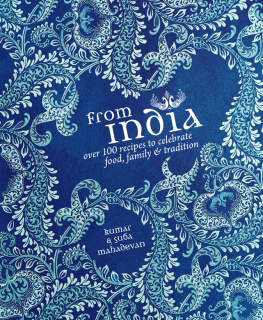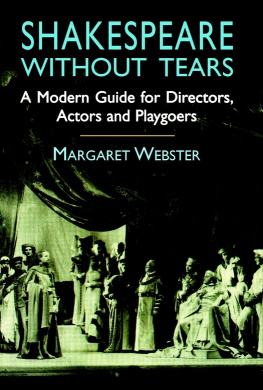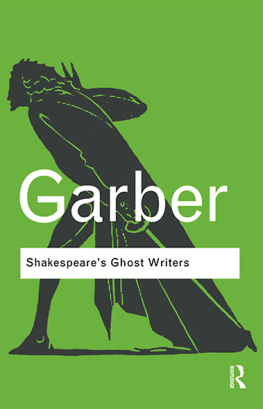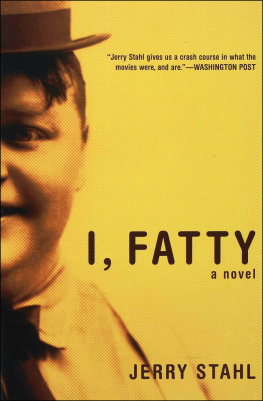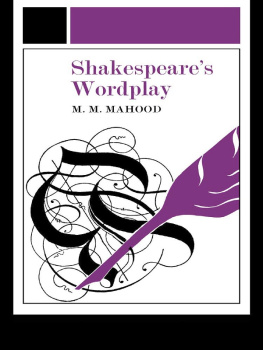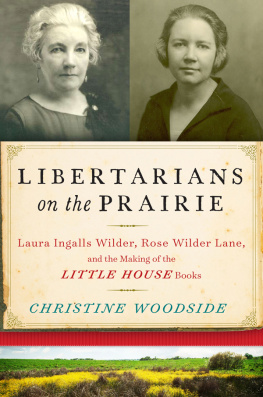1
Truths Authentic Author
O God, Horatio, what a wounded name,
Things standing thus unknown, shall live behind me!
If thou didst ever hold me in thy heart,
Absent thee from felicity awhile,
And in this harsh world draw thy breath in pain
To tell my story.
(Hamlet, V.ii.349354)
IN HAMLETS DYING APPEAL to his friend Horatio, it is difficult not to hear the voice of Shakespeare himself speaking to us across the centuries. Such is the urgency of his entreaty that we feel impelled to find out more about the author and his storyi.e., those things standing thus unknownand to tell that story to the world. Only by discovering and telling the authors true story can we hope to heal his wounded name. In its own way, this book is an attempt to do just that.
It may be objected that Hamlet is merely a character in a play, one of dozens that Shakespeare created in the course of his life. Closer examination of the canon reveals that he appears in a variety of guises throughout the Shakespeare plays. Whether writing for Berowne, Romeo, Henry VI, Richard II, Prince Hal, Jaques, Brutus, Edgar, Vincentio, Antonio, Posthumus, or Prospero (to name but a dozen), Shakespeare is forever slipping into what Frank Harris described as the Hamlet vein, thus confirming our suspicion that the author and the Prince of Denmark are one. This is not consciously contrived (indeed, it could be argued that it is an artistic fault), but is an inevitable expression of the authors individuality. In identifying with a given character Shakespeare reverts, quite naturally, to his own voicethe Hamlet voice.
Macbeth is a good example. So unlike Hamlet on the surface, he is a valiant and decisive general, whose sword in battle smok[es] with bloody execution. Yet no one can deny that, as Shakespeare paints him, he is also the sensitive, melancholy, irresolute philosopher so familiar to us from the pages of Hamlet. As Harris tellingly observes: Let us take the first appearance of Macbeth, and we are forced to remark at once that he acts and speaks exactly as Hamlet in like circumstances would act and speak. The honest but slow Banquo is amazed when Macbeth starts and seems to fear the fair promises of the witches; he does not see what the nimble Hamlet-intellect has seen in a flashthe dread means by which alone the promises can be brought to fulfilment. Even the Sonnets bear the stamp of Hamlets personality.
Shakespeares works derive much of their power from the curiously personal manner in which they speak to us, as vivid and subjective dramatizations of an individual struggle. In this regard they are unique in Elizabethan literature. Moreover, that struggle seems bound up with the question of the authors identity. Hamlet is one among a host of characters who must feign madness or assume a new identity in order to survive the rigors of the state. A prince by blood, he is prevented not only from inheriting the throne but from exercising any form of political power, turning instead to the theater as a means of influencing the ruling elite.
Hamlet is no ordinary character. His sincerity and individuality are such that he seems to break free of his literary existence, coming before us with all the sudden drama of his appearance in Ophelias closet. The vivid realism of his portrayal is startling even today; at the time it must have seemed a truly shocking innovation. More than any other Shakespearean hero, Hamlet steps outside the boundaries of the play to appeal directly to his audience, as if Shakespeare wishes to express more than the restrictions of his art will allow. Hamlet is not interested in convincing the other characters of the justice of his cause (indeed, with the exception of Horatio, we get the feeling he has given up on them): rather it is to usto posteritythat he addresses himself.
In his desire to catch the conscience of King Claudius, Hamlet stages a play called The Mousetrap, depicting the murder of which his uncle is guilty. The play, then, is used to present an alternative version of history, one that so nettles Claudius and his chief minister that the latter stops the performance. Through this device Shakespeare alerts us to the use to which he puts his own plays. Hamlet itself is an Elizabethan Mousetrap designed to hold the mirror up to Shakespeares queen, Elizabeth I. Through its tale of a disinherited prince asserting his royal right by means of the theater, Shakespeare tells his own story. With this realization we find ourselves caught up in a political intrigue that seems to demand our participation even today. Suddenly the play becomes thrillingly real. Denmark is England, and we return to the theater again and again to listen to the agonized promptings of a royal poet, as if aware on some dim level of consciousness that our history has been tampered with.
In putting on The Mousetrap before the King and Queen, Hamlet is opposing his truth and artistic vision to the political propaganda peddled by Denmarks chief minister, Polonius, whom Claudius dubs the father of good news. In this he is doing more than redressing a personal wrong; he is rewriting history for the benefit of the nation. As the Ghost of his father points out, the whole ear of Denmark has been rankly abusd by the official story put out by the governmentnamely that he, old King Hamlet, died by accident. Through drama Hamlet discloses the unrecorded history of his age; that is why he is able to describe the players as the abstract and brief chronicles of the time.
Polonius is a ruthless spin doctor who sets himself the task of protecting the lie on which the new reign is founded. In him Shakespeare coined the political doublespeak that holds our modern-day culture in thrall: circuitous, guarded, uncommitted, and ultimately inconsequential. We hear it day in day out from politicians of every stripe; it is the tangled web spun forth from the belly of deceit. Let us not forget that in priming Reynaldo to spy on his son in Paris, Polonius says, And there put on him what forgeries you please. This is not a man who respects the truth.
It is not enough to study the historical records as theyve been handed down to us by the Poloniuses of this world, for they represent a skewed perspectiveif not of a single man, then of a powerful family or faction. As George Orwell commented wryly, History is written by the winners. Queen Elizabeths chief minister and self-appointed historiographer, William Cecil, Lord Burghley, who is widely recognized as the original of Polonius, and his son Robert Cecil, later earl of Salisbury, are the men according to whose word Elizabethan history has been, and continues to be, shaped. The official records, which are often little more than propaganda, have to be studied in conjunction with the literature of the time. Together they are the warp and weft of the nations story. It would be impossible to understand the history of the Soviet Union, to take a more recent example, by confining oneself to a study of the Kremlin records. A deeply distorted picture would emerge. To gain a less biased view of the age, one would have to read the dissident poets and novelists, such as Mandelstam, Akhmatova, Zabolotsky, Bulgakov, and Solzhenitsyn, for, like Shakespeare, their works reveal the hidden or missing story: history as written by the losers. If autocratic regimes have taught us one thing, it is that fiction is simply a deeper, more elaborate way of telling the truth.
Ultimately, Hamlets petition to Horatio to tell his story is Shakespeares injunction to play the play, for his story is embedded in the text. Polonius, of course, stops the play, as authoritarian governments have been doing for centuries. Powerless to combat the sincerity and magic of Hamlets art with a valid message of his own, he censors it. If we can imagine Shakespeare in the same position vis--vis Lord Burghley and Elizabeths government, then the plays are revealed as more than simple fictions: they become precious historical and political documents.






